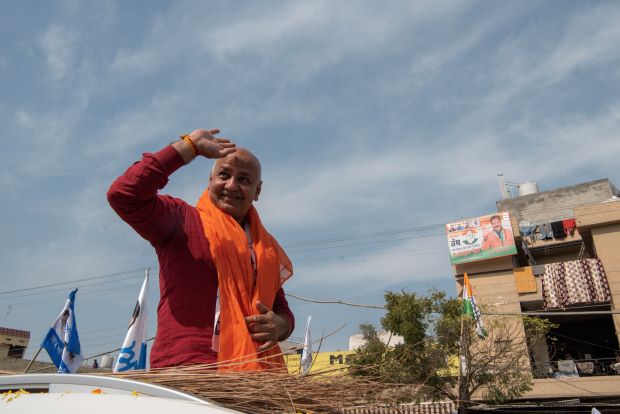Top Indian opposition leader arrested on corruption charges

By Sameer Yasir
NEW DELHI — Indian authorities have arrested a top leader of an opposition party that has tried to project itself as a rival to the ruling party of Prime Minister Narendra Modi, escalating a messy tussle that has hamstrung local governance of the capital, Delhi.
The opposition leader, Manish Sisodia, is a leading official in the Aam Aadmi Party, or AAP, and the deputy chief minister of Delhi, the No. 2 official in the regional government that controls the national capital territory.
Sisodia was arrested on corruption charges Sunday (26) by the Central Bureau of Investigation, a federal agency controlled by Modi, which accused him of irregularities in a liquor sales policy enacted by the Delhi government in 2021.
Under the policy, the Delhi government allowed private vendors to make all liquor sales in the city, a departure from earlier regulations that permitted a mix of public and private vendors to sell alcohol.
In a statement, the Central Bureau of Investigation said Sisodia had given investigators “evasive replies” when they questioned him about what they called corruption in carrying out the policy change. When he “did not cooperate,” the agency said, it arrested him.
On Monday (27), Sisodia’s supporters protested outside the offices of Modi’s Bharatiya Janata Party, or BJP, in several Indian cities, and near its office in New Delhi. They said Sisodia had been detained in a “fake case” driven by a “political vendetta.”
The AAP, which rose from an anti-corruption movement a decade ago before winning election in the national capital territory, has portrayed itself as best positioned to put up a fight against the BJP, which has entrenched its hold across much of the country.
With the once-mighty Indian National Congress party struggling in the face of Modi’s dominance, the AAP, although much smaller than Congress, has tried to extend its reach beyond Delhi and the state of Punjab, the two places where it runs the local government. In the process, it has found itself in the BJP’s crosshairs.
In December, the party bolstered its national status by winning about 13% of the vote in a state election in Gujarat, home to Modi, which gave it five seats in a regional assembly controlled for decades by the BJP.
That same month, the two parties clashed in a bitterly fought municipal election in Delhi. Even though the AAP won a clear majority of seats, it took weeks, including several violently disrupted attempts and an appeal to the country’s Supreme Court, for the party to be able to seat one of its own elected councillors as mayor.
The violence did not stop there. Last week, several members from both parties were seen punching, kicking and throwing chairs at each other inside the hall of the civic body.
Sisodia is a trusted lieutenant of Arvind Kejriwal, the chief minister of Delhi. He has been central to Kejriwal’s efforts to build the party’s presence across several states on the promise of better delivery of government services and improvement of schools and clinics.
Neerja Chowdhury, a columnist and political analyst in New Delhi, said the AAP’s rise had led to a clear backlash from Modi’s party, with many of Kejriwal’s closest aides already in jail.
“With that, the ruling government’s credibility also comes into question,” Chowdhury said, “because they have used federal agencies against political opponents, one after another.”
The new liquor policy, members of the AAP said, was intended to stop black market sales, increase revenue and ensure equitable distribution of liquor licenses. It also allowed private vendors to deliver liquor to homes.
The Delhi government withdrew the policy after a top bureaucrat accused Sisodia of receiving “kickbacks” and “commissions” that were used to finance election campaigns. Soon after, the federal police began an investigation.
Manoj Tiwari, a BJP member of the federal Parliament, said that the justice system would take its course and that the federal investigation was impartial.
“They are corrupt,” Tiwari said, referring to the leaders of the AAP. “They have to face the law.”
-New York Times


Comments are closed, but trackbacks and pingbacks are open.